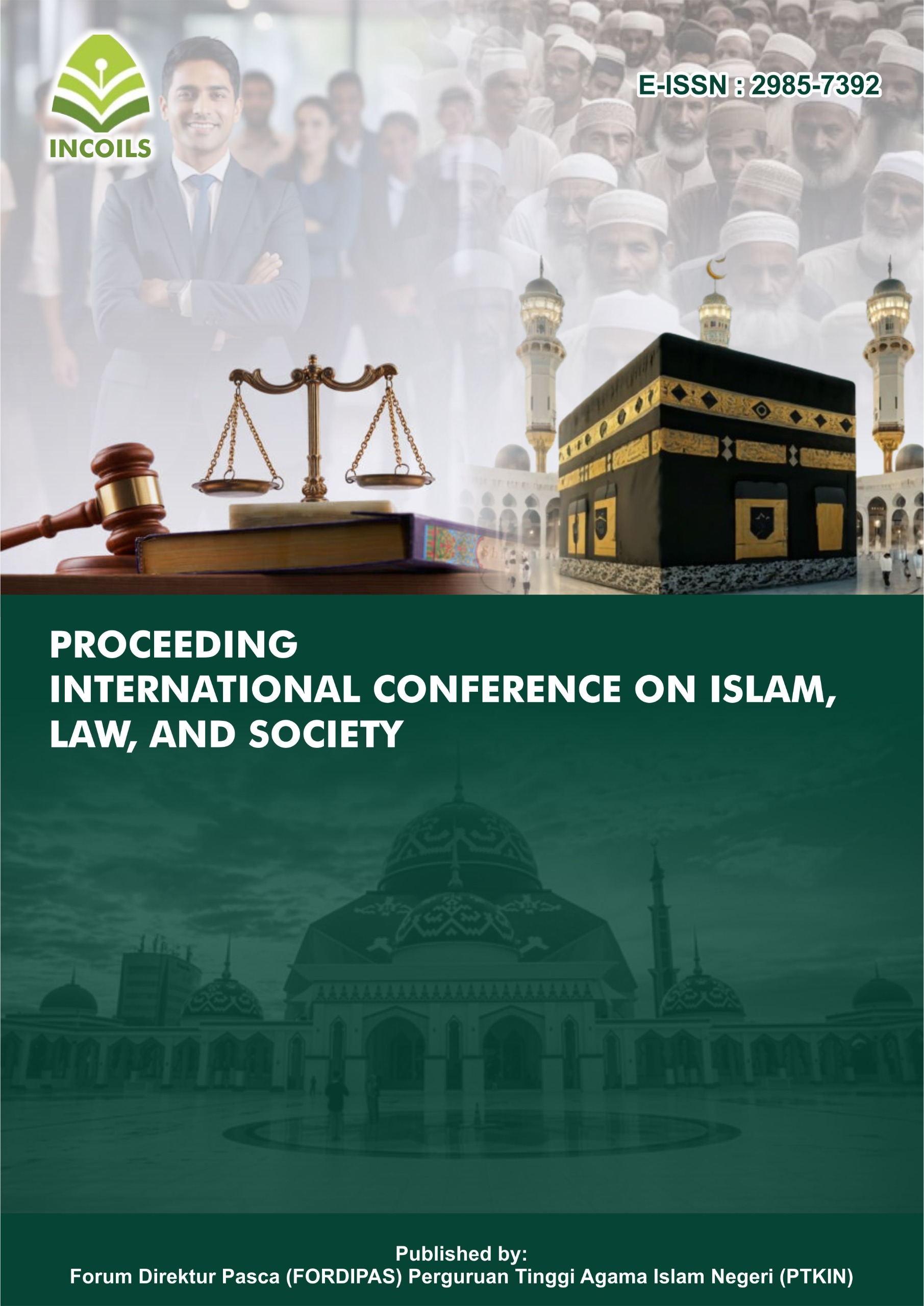Al-Tahkim Al-Tsawabit and Res Judicata Doctrine Reconciling Islamic Law Principles into Constitutional Court Decisions
DOI:
https://doi.org/10.70062/incoils.v3i1.123Abstract
This research aims to utilize the concepts of "al-tahkim" and "al-tsawabit" based on the Maqashidul Quran to examine the doctrine of res judicata as the primary argument for declaring the Constitutional Court's decisions as final and binding, thus preventing them from being contested. However, certain Constitutional Court decisions at the intersection of human rights and religious life may raise academic concerns, such as the recognition of Aliran Kebatinan as a religion, despite its ritual system resembling Islam. Using a qualitative approach, this study analyzes Islamic jurisprudence, constitutional law literature, and relevant legal cases where "tahkim" and "ats tsawabit" were invoked. It also delves into Islamic sources like the Quran, Sunnah, and scholarly consensus to identify foundational principles. The findings underscore how these concepts can guide the interpretation of legal principles, such as the Res Judicata doctrine, ensuring justice, fairness, and the preservation of rights while harmonizing Islamic jurisprudence with constitutional principles. This research contributes to the reconciliation of Islamic legal principles with constitutional law, offering insights for scholars, practitioners, and policymakers grappling with this intersection. It alleviates academic concerns and promotes justice and fairness in constitutional contexts.
References
al-Attar, M. (2017). Meta-ethics: A quest for an epistemological basis of morality in classical Islamic thought. Journal of Islamic Ethics, 1(1), 29-50, https://doi.org/10.1163/24685542-12340003
Chafetz, J. (2008). Leaving the House: The constitutional status of resignation from the house of Representatives. Duke Law Journal, 58 (2), 177-236, ISSN 0012-7086
Corbin, J. (1990). Grounded theory research: Procedures, canons, and evaluative criteria. Qualitative Sociology, 13(1), 3-21, ISSN 0162-0436, https://doi.org/10.1007/BF00988593
Dali, N. (2018). Prioritization of the indicators and sub-indicators of Maqasid al-Shariah in measuring the liveability of cities. International Journal of the Analytic Hierarchy Process, 10(3), 348-371, https://doi.org/10.13033/ijahp.v10i3.597
Elviandri (2018). The formulation of welfare state: The perspective of Maqāid al-Sharī'ah. Indonesian Journal of Islam and Muslim Societies, 8(1), 117-146, ISSN 2089-1490, https://doi.org/10.18326/ijims.v8i1.117-146
Elviandri (2018). The formulation of welfare state: The perspective of Maqāsid al-Sharī'ah. Indonesian Journal of Islam and Muslim Societies, 8 (1), 117-146, https://doi.org/10.18326/ijims.v8i1.117-146
George, T.E. (1992). On the Nature of Supreme Court Decision Making. American Political Science Review, 86(2), 323-337, https://doi.org/10.2307/1964223
Groussot, X. (2007). Res judicata in the court of justice case-law: Balancing legal certainty with legality? European Constitutional Law Review, 3(3), 385-417, https://doi.org/10.1017/S1574019607003859
Guest, G. (2020). A simple method to assess and report thematic saturation in qualitative research. PLoS ONE, 15(5), ISSN 1932-6203, https://doi.org/10.1371/journal.pone.0232076
Guyanie, G. El (2021). The constitutional rights of indigenous beliefs adherents in minority fiqh perspective. Ijtihad: Jurnal Wacana Hukum Islam dan Kemanusiaan, 21(2), 155-175, ISSN 1411-9544, <https://doi.org/10.18326/ijtihad.v21i2.155-175>
Ibrahim, Y.S. (2014). An Examination of the Modern Discourse on Maqāṣid al-Sharī‘a. Journal of the Middle East and Africa, 5(1), 39-60, https://doi.org/10.1080/21520844.2014.882676
Jackson, S. (1993). From prophetic actions to constitutional theory: A novel chapter in medieval Muslim jurisprudence. International Journal of Middle East Studies, 25(1), 71-90, https://doi.org/10.1017/S0020743800058050
Keyes, J.M. (1989). Expressio unius: The expression that proves the rule. Statute Law Review, 10(1), 1-25, ISSN 0144-3593, https://doi.org/10.1093/slr/10.1.1
Kwak, K. (2004). Overlaps and Conflicts of Jurisdiction between the World Trade Organization and Regional Trade Agreements. Canadian Yearbook of International Law, 41, 83-109, https://doi.org/10.1017/S0069005800008274
Maarif, S. (2022). Second Essay Toward a (More) Inclusive FORB: A Framework for the Advocacy for the Rights of Indigenous People. Interreligious Studies and Intercultural Theology, 6(2), 205-212, ISSN 2397-3471, https://doi.org/10.1558/isit.24947
MEDINA, D.E.L. (2021). Constitutional "res judicata" at thirty years of evolution: Flexibilization of the principle and a new balance between stability and change in the judicial review of statutes. Revista Derecho del Estado(50), 261-291, ISSN 0122-9893, https://doi.org/10.18601/01229893.N50.09
Muchimah (2020). Implementasi Putusan Mahkamah Konstitusi tentang Hak Konstitusi Bagi Penganut Kepercayaan terhadap Tuhan Yang Maha Esa. Volksgeist: Jurnal Ilmu Hukum dan Konstitusi, 3(1), 53-67, ISSN 2615-174X, <https://doi.org/10.24090/volksgeist.v3i1.3723>
Nafi, B.M. (2005). Tāhir ibn 'Āshūr: The Career and Thought of a Modern Reformist 'ālim, with Special Reference to His Work of tafsīr. Journal of Qur'anic Studies, 7(1), 1-32, ISSN 1465-3591, https://doi.org/10.3366/jqs.2005.7.1.1
Nalle, V.I.W. (2021). The Politics of Intolerant Laws against Adherents of Indigenous Beliefs or Aliran Kepercayaan in Indonesia. Asian Journal of Law and Society, 8(3), 558-576, ISSN 2052-9015, https://doi.org/10.1017/als.2020.54
Opwis, F. (2017). New trends in Islamic legal theory: Maqasid al-Shari'a as a new source of law? Welt des Islams, 57(1), 7-32, ISSN 0043-2539, https://doi.org/10.1163/15700607-00571p03
Rodrigues, P.G. (2020). Redefining claim preclusion from verdict sovereignty: Partial res judicata in jury trials. Revista Brasileira de Direito Processual Penal, 6(2), 873-910, ISSN 2359-3881, https://doi.org/10.22197/rbdpp.v6i2.301
Rohayana, A.D. (2021). Islamic Jurisprudence Implementation in Indonesia: Perspective of the Objectives of Islamic Law. Global Jurist, 21(2), 403-415, https://doi.org/10.1515/gj-2020-0078
Shany, Y. (2009). Regulating Jurisdictional Relations Between National and International Courts. Regulating Jurisdictional Relations Between National and International Courts, 1-256, https://doi.org/10.1093/acprof:oso/9780199211791.001.0001
Thabrani, A.M. (2018). Maqashid Revitalization in Global Era: Istidlal Study from Text to Context. Al-Ihkam: Jurnal Hukum dan Pranata Sosial, 13(2), 310-333, https://doi.org/10.19105/al-lhkam.v13i2.1814
Thomas, D.R. (2006). A General Inductive Approach for Analyzing Qualitative Evaluation Data. American Journal of Evaluation, 27(2), 237-246, ISSN 1098-2140, https://doi.org/10.1177/1098214005283748
Viri, K, & Febriany, Z (2020). Dinamika Pengakuan Penghayat Kepercayaan di Indonesia. Indonesian Journal of Religion and Society, journal.lasigo.org, https://journal.lasigo.org/index.php/IJRS/article/view/119
Voulgarakis, K.D. (2020). Reflections on the scope of “EU res judicata” in the context of Regulation 1215/2012. Journal of Private International Law, 16(3), 451-464, ISSN 1744-1048, https://doi.org/10.1080/17441048.2020.1809768
Wahidin (2020). Impact of covid-19 pandemic on the implementation of islamic fiqh al-tasawabit and al-mutaghayyirat approaches. Systematic Reviews in Pharmacy, 11 (12), 1102-1107, https://doi.org/10.31838/srp.2020.5.160
Downloads
Published
How to Cite
Issue
Section
License

This work is licensed under a Creative Commons Attribution-ShareAlike 4.0 International License.







